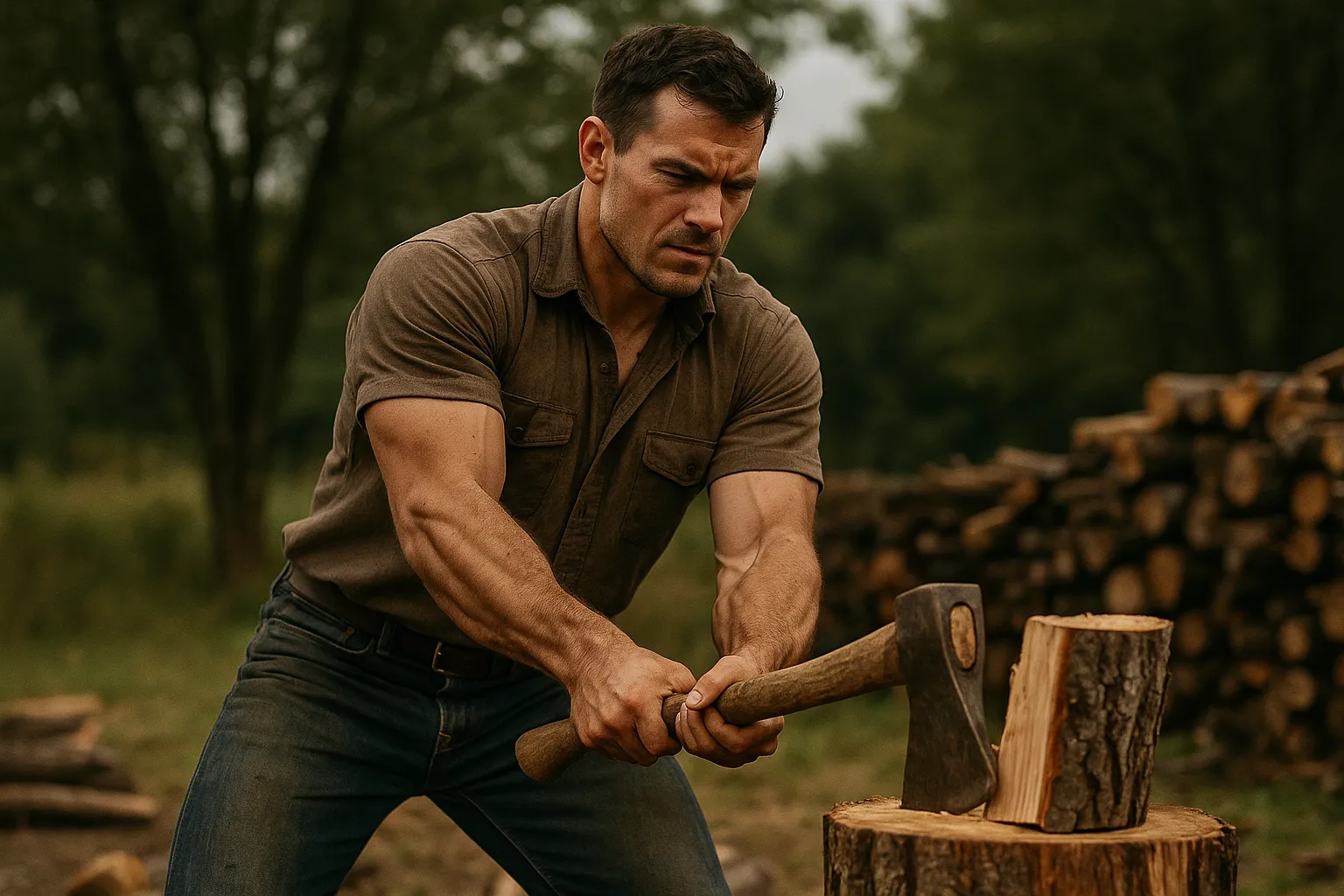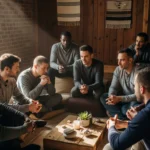The Forgotten Blueprint of Male Strength
In a world dominated by convenience, screens, and soft living, modern men often feel disconnected from their bodies — not in terms of fitness alone, but in resilience, purpose, and grounded presence. Our grandfathers, and the generations before them, didn’t have gyms, apps, or wearables. Yet they were tough. Not just physically — but mentally and emotionally resilient. They endured war, built homes with their hands, woke up before sunrise, and returned only when the work was done.
There’s a quiet strength that lived in their routines. Their lifestyle wasn’t optimized for aesthetics but for survival, family, and contribution. While society has evolved, many of those rituals have been lost — and with them, a layer of masculine identity that today’s men are silently starving for.
This post is a journey back. Not to mimic the past, but to rediscover the timeless elements that forged our ancestors into men of strength. Elements that modern life has suppressed, but that we can still revive.
Manual Labor: The Original Strength Training
Before kettlebells and CrossFit, there were shovels, axes, hay bales, and toolboxes. Daily physical labor naturally built strength, mobility, and endurance. Our grandfathers didn’t train to look strong — they became strong by lifting what life demanded.
Cutting wood, digging trenches, hauling stone — these weren’t workouts, they were acts of necessity. But with them came core strength, calloused hands, and a deep sense of usefulness. They knew what their bodies were capable of because they used them every day.
Today, you might not have fields to plow or barns to raise. But you can bring that essence back through meaningful movement. Shift your perspective: don’t train just for muscle — train to build your capability to handle life. Deadlift not for numbers, but to feel what it’s like to lift your child without strain. Walk long distances. Carry heavy things. Clean your own space. Fix something. Build something.
Reintroducing practical movement into your routine grounds you. It creates a relationship with your body that’s far deeper than chasing six-pack abs. It’s the strength of being useful — a core tenet of traditional masculinity.
Discomfort as a Daily Discipline
Comfort is one of the biggest threats to modern resilience. We’ve built a world where we’re always warm, always fed, always entertained. But our ancestors knew struggle — cold mornings, physical pain, hunger, uncertainty. And through that discomfort, they built mental grit.
Modern research now proves what they lived instinctively: exposure to controlled discomfort increases stress resilience, cognitive performance, and even emotional regulation. Cold water plunges, intermittent fasting, long walks in the rain — these are not fads. They’re echoes of our past.
The idea isn’t to suffer for its own sake. It’s to reintroduce friction into your day in ways that sharpen you. Try starting your mornings with an icy shower. Or fast for 16 hours once a week. Or take a device-free walk in the freezing wind. Each small act of chosen discomfort reprograms your nervous system to stop panicking when life gets hard.
It reminds you that you’re built to handle more than you think — not just physically, but mentally too.
Rising with the Sun: The Rhythm of Hardworking Men
Your grandfather likely didn’t hit snooze three times. He got up before daylight — not because he wanted to, but because the world demanded it. That rhythm, tied to nature and necessity, wasn’t just productive — it was healing.
Waking early is more than a productivity hack. It aligns your biology with the earth’s rhythm. Early light regulates your circadian rhythm, enhances testosterone, and balances your mood. Morning solitude gives clarity, intention, and space — before the noise creeps in.
But more than anything, waking early is a statement. It says, “I show up.” Even when you don’t want to. Even when no one’s watching.
Start small. Get up 30 minutes earlier. Step outside, barefoot if you can. Breathe. Stretch. Write. Move your body. Make it a ritual, not a chore. You’re not just being productive — you’re honoring the work ethic of the men who came before you.
Being of Service: Strength with a Purpose
One of the most overlooked aspects of masculine resilience is the motivation behind it. Our grandfathers didn’t just work hard for themselves. They worked to feed their families, build homes, defend nations. Their strength wasn’t self-serving — it was rooted in responsibility.
Masculinity with no outlet for service becomes empty. That’s why so many men who “optimize” their health still feel lost. Fitness without purpose breeds vanity. But strength with responsibility becomes sacred.
You don’t need a battlefield or a homestead to carry this forward. Ask yourself: Who are you showing up for? Who depends on you? What can you build, fix, contribute, or teach today?
Start with small acts of service: Cook a meal. Check in on a friend. Help your neighbor lift something heavy. Take care of something no one else will. When your strength becomes useful to others, your sense of self-worth multiplies.
And it’s not just emotional — studies show that men who identify as caregivers and protectors tend to have higher testosterone, better heart health, and longer lifespans. Service isn’t soft. It’s biologically hardwired into male wellness.
Living Closer to the Land: Nature as a Mirror
Your grandfather likely had a garden, hunted game, or at the very least, worked under open skies. Nature wasn’t a weekend escape — it was part of life. And it offered something that gyms and screens never will: grounding.
Modern life cuts us off from natural cues. Artificial light, air conditioning, blue screens, food wrapped in plastic. The result? Disorientation, anxiety, and hormonal confusion.
Reconnecting with the land, even in small ways, begins to reset this. Touch soil with your hands. Grow something. Spend time under trees. Watch a sunset without photographing it. Hunt or fish if it speaks to you. Chop your own firewood. Sit in silence in the woods.
These aren’t hobbies — they’re ancient recalibrations. The land doesn’t lie. It reflects your energy, your tension, your calm. It teaches patience, humility, and reverence.
And when you reconnect with the land, you reconnect with yourself — not the you designed by modern pressures, but the deeper version forged over millennia of survival.
Rites of Passage: What Modern Men Are Missing
In traditional societies, a boy became a man through intentional challenge — a rite of passage. Whether it was a solo journey into the wilderness, a trial of pain or endurance, or a symbolic confrontation with fear, these ceremonies were not arbitrary. They served a deep purpose: to mark transformation, to signal to the boy and the community that he had crossed a threshold into adult responsibility.
Today, those rituals are gone. Most men drift into adulthood with no defined moment of change — no hardship to bond them to their strength, no symbolic death of the boy-self, no welcoming into manhood. This absence leaves a hole. Many men feel it unconsciously, searching for it through reckless behavior, endless achievement, or numbing distractions.
But while tribal rituals may no longer be common, their core can be revived. Create your own rite of passage. Choose something difficult — something that tests your mind, body, and spirit. A multi-day hike alone in nature. A 24-hour fast with intention and reflection. A vow of silence. Cold exposure. A deep digital detox paired with journaling and meditation.
What matters is not the act itself, but that it challenges your identity. That it marks a transition. That you emerge from it with a new understanding of who you are and what you stand for. These self-imposed trials awaken a dormant strength — one that’s been passed down through generations but often lies untouched.
Protecting, Not Just Performing
Our culture teaches men to perform — to achieve, dominate, and win. But that’s only half the story. Our grandfathers also protected. They weren’t only warriors; they were shepherds of families, quiet defenders of communities, and keepers of tradition.
The protector archetype is calm, aware, and strong. It isn’t about brute force — it’s about discernment, sacrifice, and presence. It’s the man who steps between danger and his loved ones, not because he’s fearless, but because he’s responsible. It’s the man who provides emotional safety, not just financial support.
This mindset shift changes how you relate to your health and strength. You no longer lift weights just to look good — you lift so your aging parents can rely on you. You no longer eat well just for aesthetics — you eat to be present for your children. Your mental clarity isn’t just about career success — it’s about leading well under stress.
To revive this protector energy, ask yourself: What (or who) am I protecting? And what kind of man must I become to do that well? This question alone can reorder your priorities and elevate your sense of purpose.
Discipline as a Language of Integrity
Modern life is filled with distractions, quick dopamine hits, and effortless shortcuts. Discipline is often framed as punishment — something harsh or limiting. But in the world of our grandfathers, discipline was identity. It wasn’t about control; it was about alignment.
Waking up early, completing tasks, delaying gratification — these weren’t heroic. They were expected. Discipline wasn’t for show; it was for trust. When a man said he’d do something, he did it. His word had weight because his actions followed through.
That level of internal congruence is rare today. We say we’ll change — then don’t. We set goals — then scroll. We promise others — and break promises to ourselves. Over time, that erodes confidence. Not just confidence in public, but deep personal trust.
To rebuild this trust, start small. Choose one thing each day and follow through no matter what. A workout. A cold shower. A promise to finish a task. As you accumulate small wins, your integrity grows — and with it, your masculine presence.
Remember: discipline isn’t self-denial. It’s self-respect in action.
Eldership and the Value of Generational Wisdom
In many ancient cultures, elders weren’t discarded or ignored — they were honored. They were the keepers of stories, the guides through uncertainty, the anchors of the community. Modern society, obsessed with youth and speed, often forgets this role. Older men are sidelined, their wisdom left untapped.
But grandfathers — literal or symbolic — carry treasure. Their scars are maps. Their memories are medicine. And younger men, when disconnected from elder guidance, often repeat avoidable mistakes.
If you don’t have an elder in your life, find one. Look for older mentors who carry grace and gravity. Listen to their stories. Ask questions. Observe how they move. And if you are entering that season of life — step into it fully. Don’t retreat. Speak, share, mentor. Pass down what you’ve earned.
When masculine strength is passed from generation to generation, it becomes less about ego and more about legacy.
Quiet Rituals of Power
There’s a myth that real strength is loud — that power is about dominance, noise, and intensity. But many of the strongest men move quietly. They keep sacred rituals that center them — early walks, handwritten letters, silent prayer, sharpening tools, or reading sacred texts before bed.
These are not grand gestures. They’re not Instagram-worthy. But they are anchors — reminders of who they are, where they’ve come from, and what matters most.
Create rituals that speak to you. Morning breathwork. Lighting a candle as the sun rises. Practicing slow martial arts. Tending a garden. Preparing a meal with full attention. These small acts, repeated daily, form the core of who you are.
They are what you return to when the world gets chaotic. They hold you together when everything else falls apart.
A Final Reflection: Strength That Lasts
The resilience of our grandfathers wasn’t built in a week. It was cultivated over decades of consistent effort, enduring values, and unshakable roles. They didn’t read ten books on discipline — they lived it. They didn’t need affirmation — their strength was in showing up.
We may not live in the same world, but we face our own battles: emotional numbness, overstimulation, existential doubt. And the truth is, ancient tools still work. The rituals that made our grandfathers strong aren’t relics — they’re invitations.
Invitations to return to something deeper. To redefine masculinity not through modern trends, but through timeless practice. To become men who are capable, not just in muscle — but in mind, in presence, in purpose.
Start where you are. One ritual. One decision. One small return to a strength that never truly left.
Because deep down, that strength lives in you — waiting to be called forth.







